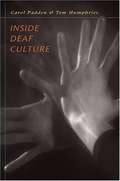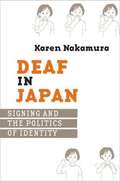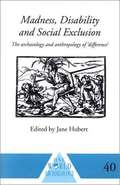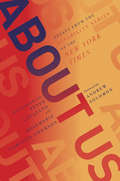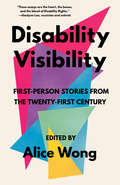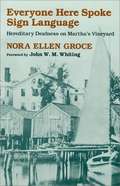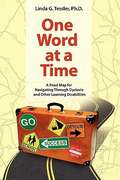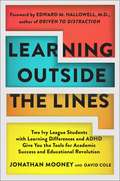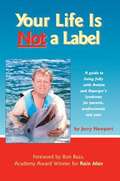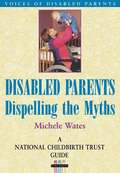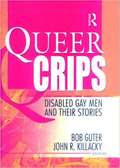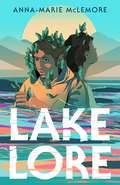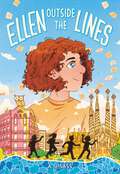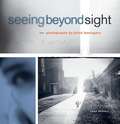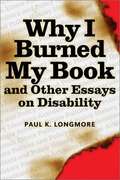Special Collections
2025 Disability Collection
Description: Description: Bookshare is pleased to offer a collection focused on the topic of disability and accessibility. #disability
- Table View
- List View
Inside Deaf Culture
by Carol Padden and Tom HumphriesIn this [account] of the changing life of a community, the authors of Deaf in America reveal historical events and forces that have shaped the ways that Deaf people define themselves today. Inside Deaf Culture relates Deaf people's search for a voice of their own, and their proud self-discovery and self description as a flourishing culture.
Padden and Humphries show how the nineteenth-century schools for the deaf, with their denigration of sign language and their insistence on oralist teaching, shaped the lives of Deaf people for generations to come. They describe how Deaf culture and art thrived in mid-twentieth-century Deaf clubs and Deaf theater, and they profile controversial contemporary technologies.
Most triumphant is the story of the survival of the rich and complex American Sign Language long misunderstood but finally recognized by a hearing world that could not conceive of language in a form other than speech. In a moving conclusion, the authors describe their own very different pathways into the Deaf culture, and reveal the confidence and the anxiety of the people of this tenuous community as it faces the future.
Deaf in Japan
by Karen NakamuraUntil the mid-1970s, deaf people in Japan had few legal rights and little social recognition. Legally, they were classified as minors or mentally deficient, unable to obtain driver's licenses or sign contracts and wills.
Madness, Disability and Social Exclusion
by Jane HubertA unique work that brings together a broad range of specialist disciplines to create a new perspective on social and physical exclusion from society. Brings a much needed comparative approach to the subject of disability. Confinement, hermaphrodites, killing of disabled children, leprosy, deafness, and funerary rituals are explored.
About Us
by Peter Catapano and Rosemarie Garland-ThomsonBased on the pioneering New York Times series, About Us collects the personal essays and reflections that have transformed the national conversation around disability.
Boldly claiming a space in which people with disabilities can be seen and heard as they are—not as others perceive them—About Us captures the voices of a community that has for too long been stereotyped and misrepresented. Speaking not only to those with disabilities, but also to their families, coworkers and support networks, the authors in About Us offer intimate stories of how they navigate a world not built for them. Since its 2016 debut, the popular New York Times’ “Disability” column has transformed the national dialogue around disability. Now, echoing the refrain of the disability rights movement, “Nothing about us without us,” this landmark collection gathers the most powerful essays from the series that speak to the fullness of human experience—stories about first romance, childhood shame and isolation, segregation, professional ambition, child-bearing and parenting, aging and beyond.
Reflecting on the fraught conversations around disability—from the friend who says “I don’t think of you as disabled,” to the father who scolds his child with attention differences, “Stop it stop it stop it what is wrong with you?”—the stories here reveal the range of responses, and the variety of consequences, to being labeled as “disabled” by the broader public.
Here, a writer recounts her path through medical school as a wheelchair user—forging a unique bridge between patients with disabilities and their physicians. An acclaimed artist with spina bifida discusses her art practice as one that invites us to “stretch ourselves toward a world where all bodies are exquisite.” With these notes of triumph, these stories also offer honest portrayals of frustration over access to medical care, the burden of social stigma and the nearly constant need to self-advocate in the public realm.
In its final sections, About Us turns to the questions of love, family and joy to show how it is possible to revel in life as a person with disabilities. Subverting the pervasive belief that disability results in relentless suffering and isolation, a quadriplegic writer reveals how she rediscovered intimacy without touch, and a mother with a chronic illness shares what her condition has taught her young children. With a foreword by Andrew Solomon and introductory comments by co-editors Peter Catapano and Rosemarie Garland-Thomson, About Us is a landmark publication of the disability movement for readers of all backgrounds, forms and abilities.
Topics Include: Becoming Disabled • Mental Illness is not a Horror Show • Disability and the Right to Choose • Brain Injury and the Civil Right We Don’t Think • The Deaf Body in Public Space • The Everyday Anxiety of the Stutterer • I Use a Wheelchair. And Yes, I’m Your Doctor • A Symbol for “Nobody” That’s Really for Everybody • Flying While Blind • My $1,000 Anxiety Attack • A Girlfriend of My Own • The Three-Legged Dog Who Carried Me • Passing My Disability On to My Children • I Have Diabetes. Am I to Blame? • Learning to Sing Again • A Disabled Life is a Life Worth Living
Disability Visibility
by Alice Wong&“Disability rights activist Alice Wong brings tough conversations to the forefront of society with this anthology. It sheds light on the experience of life as an individual with disabilities, as told by none other than authors with these life experiences. It's an eye-opening collection that readers will revisit time and time again.&” —Chicago TribuneOne in five people in the United States lives with a disability. Some disabilities are visible, others less apparent—but all are underrepresented in media and popular culture. Activist Alice Wong brings together this urgent, galvanizing collection of contemporary essays by disabled people, just in time for the thirtieth anniversary of the Americans with Disabilities Act,From Harriet McBryde Johnson&’s account of her debate with Peter Singer over her own personhood to original pieces by authors like Keah Brown and Haben Girma; from blog posts, manifestos, and eulogies to Congressional testimonies, and beyond: this anthology gives a glimpse into the rich complexity of the disabled experience, highlighting the passions, talents, and everyday lives of this community. It invites readers to question their own understandings. It celebrates and documents disability culture in the now. It looks to the future and the past with hope and love.
Everyone Here Spoke Sign Language
by Nora E. GroceFrom the seventeenth century to the early years of the twentieth, the population of Martha's Vineyard manifested an extremely high rate of profound hereditary deafness.
In stark contrast to the experience of most deaf people in our own society, the Vineyarders who were born deaf were so thoroughly integrated into the daily life of the community that they were not seen-- and did not see themselves-- as handicapped or as a group apart. Deaf people were included in all aspects of life, such as town politics, jobs, church affairs, and social life.
How was this possible? On the Vineyard, hearing and deaf islanders alike grew up speaking sign language. This unique sociolinguistic adaptation meant that the usual barriers to communication between the hearing and the deaf, which so isolate many deaf people today, did not exist.
One Word at a Time
by Linda G. TesslerA unique and groundbreaking resource guide that is informative, insightful and inspiring, this book is Tessler's brave and honest account of her lifelong struggles with dyslexia. Culled from her experiences as a psychologist and scholar specializing in learning disabilities and as the parent of a son who struggles with dyslexia, she brings together sound psychological principles with personal knowledge.
Learning Outside The Lines
by Edward M. Hallowell and Jonathan Mooney and David Coleoward personal empowerment and profound educational change, proving once again that rules sometimes need to be broken.
Your Life is Not A Label
by Jerry NewportThis book describes Jerry's life and how he dealt with the challenges of Asperger syndrome. It also lets you, the reader know of things you should and shouldn't do, as well as Jerry's mistakes.
Disabled Parents
by Michelle WatesPublished by the National Childbirth Trust of Great Britain, this book is largely based on a series of interviews with 21 physically disabled parents. All of the parents in the study had orthopedic disabilities, and most are wheelchair users. As the author assures us in the first chapter, "This is not another book about heroines." The interviewees talk honestly about the joys and frustrations of parenting, access issues, attitudinal barriers, support networks, dealing with professionals, and their efforts to show the world that their families are essentially "normal." Wates, a disability-rights activist who is herself a wheelchair user, also discusses several support groups for disabled parents which have emerged in the U.K., and makes suggestions about how such groups can be launched and maintained.
Queer Crips
by John R. Killacky and Bob Guterthis is an anthology of essays and short stories about gay men who are also disabled. Many of the stories and essays are taken from Bent, an on-line publication that gives voice to the often silent voices of disabled gay men.
Lakelore
by Anna-Marie McLemoreIn this young adult novel by award-winning author Anna-Marie McLemore, two non-binary teens are pulled into a magical world under a lake - but can they keep their worlds above water intact? Everyone who lives near the lake knows the stories about the world underneath it, an ethereal landscape rumored to be half-air, half-water. But Bastián Silvano and Lore Garcia are the only ones who’ve been there. Bastián grew up both above the lake and in the otherworldly space beneath it. Lore’s only seen the world under the lake once, but that one encounter changed their life and their fate.Then the lines between air and water begin to blur. The world under the lake drifts above the surface. If Bastián and Lore don’t want it bringing their secrets to the surface with it, they have to stop it, and to do that, they have to work together. There’s just one problem: Bastián and Lore haven’t spoken in seven years, and working together means trusting each other with the very things they’re trying to hide.
Ellen Outside the Lines
by A. J. SassWinner of a Sydney Taylor Book Award Honor! A heartfelt novel about a neurodivergent thirteen-year-old navigating changing friendships, a school trip, and expanding horizons for fans of Rain Reign and Ivy Aberdeen's Letter to the World. Thirteen-year-old Ellen Katz feels most comfortable when her life is well planned out and people fit neatly into her predefined categories. She attends temple with Abba and Mom every Friday and Saturday. Ellen only gets crushes on girls, never boys, and she knows she can always rely on her best-and-only friend, Laurel, to help navigate social situations at their private Georgia middle school. Laurel has always made Ellen feel like being autistic is no big deal. But lately, Laurel has started making more friends, and cancelling more weekend plans with Ellen than she keeps. A school trip to Barcelona seems like the perfect place for Ellen to get their friendship back on track. Except it doesn't. Toss in a new nonbinary classmate whose identity has Ellen questioning her very binary way of seeing the world, homesickness, a scavenger hunt-style team project that takes the students through Barcelona to learn about Spanish culture and this trip is anything but what Ellen planned. Making new friends and letting go of old ones is never easy, but Ellen might just find a comfortable new place for herself if she can learn to embrace the fact that life doesn't always stick to a planned itinerary.
Seeing Beyond Sight
by Tony DeifellFor five years Tony Deifell taught teenagers to take photographs. His students were blind. Unusual as the idea may seem at first, putting cameras in the hands of visually impaired children proved to be extremely fruitful both for the photographers, who found an astonishing new means of self-expression, and for the viewers of their images, for whom this is an entirely new kind of dreamlike and intuitive creation. Even before you know that these pictures were taken by blind teenagers, they are striking in their use of light and composition, and haunting in their chiaroscuro intensity. To learn more, visit http://www.seeingbeyondsight.org/
Why I Burned My Book And Other Essays On Disability
by Paul K. LongmoreThis wide-ranging book shows why Paul Longmore is one of the most respected figures in disability studies today. Understanding disability as a major variety of human experience, he urges us to establish it as a category of social, political, and historical analysis in much the same way that race, gender, and class already have been. The essays here search for the often hidden pattern of systemic prejudice and probe into the institutionalized discrimination that affects the one in five Americans with disabilities.
Whether writing about the social critic Randolph Bourne, contemporary political activists, or media representations of people with disabilities, Longmore demonstrates that the search for heroes is a key part of the continuing struggle of disabled people to gain a voice and to shape their destinies. His essays on bioethics and public policy examine the conflict of agendas between disability rights activists and non-disabled policy makers, healthcare professionals, euthanasia advocates, and corporate medical bureaucracies.
The title essay, which concludes the book, demonstrates the necessity of activism for any disabled person who wants access to the American dream.
Author note: Paul K. Longmore is Professor of History at San Francisco State University. He is the author of The Invention of George Washington and the co-editor (with Lauri Umansky) of The New Disability History: American Perspectives.
